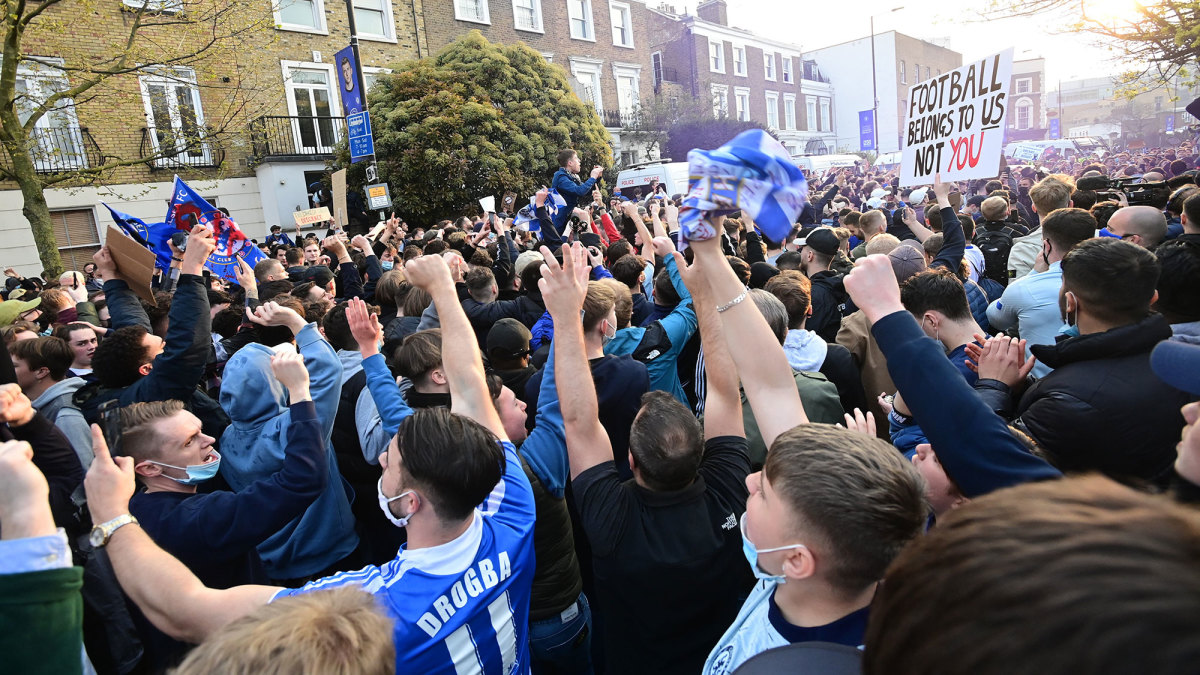The Super League's Dominoes Come Crashing Down
Fulham Road, which runs parallel to King’s Road through southwest London, is usually closed to traffic when Chelsea is at home—although recently, due to the pandemic, there has been no need. But on Tuesday night, before Chelsea's game against Brighton, police once again blocked access between Fulham Broadway and Brompton Cemetery, allowing a demonstration of several hundred fans.
There were smoke bombs and chants, placards and banners, a strange sense of carnival in the early evening spring sunshine. But these were not the usual chants. This was a protest. What they lacked in creativity they made up for in gusto. “F*** Super League, f*** super league, f*** super league,” ran one. “F*** Pérez,” ran another, their anger directed at Real Madrid president Florentino Pérez, who is also the chairman of the European Super League.
And then, in the early evening spring sunshine, a remarkable moment. News broke shortly before 7 p.m. local time that Chelsea was preparing to withdraw from the proposed Super League. It was celebrated like a goal. There was a roar and arms flew aloft. The footage deserves to become famous: the moment the breakaway ended.
News of Chelsea preparing to pull out of the Super League filters through to the Fulham Road... pic.twitter.com/xNEdpeHRar
— Oliver Todd (@oliver_todd) April 20, 2021
🎶 WE SAVED FOOTBALL 🎶
— ESPN FC (@ESPNFC) April 20, 2021
Chelsea fans celebrate the news that the club has begun the process to leave the Super League.
(via @RiyadDilhan) pic.twitter.com/QIOQAoMN6r
Within half an hour, it was reported that Manchester City was also planning to withdraw, with the club becoming the first to make its stance official soon after. (Pep Guardiola had publicly criticized the Super League plan earlier in the day.) And within half an hour of the initial chatter about City came reports that Atlético Madrid and the other English clubs were set to follow suit—and that Ed Woodward was planning to resign as CEO of Manchester United. Later, Liverpool players released a collective statement that read, "We don't like it and we don't want it to happen," and by day's end, United, Liverpool, Tottenham and Arsenal all announced their withdrawals. The dominoes didn't take long to fall.
For Chelsea, the final straw was said to be a meeting between the squad and club chairman Bruce Buck at which the players expressed their doubts about the plan, and particularly the possibility that they might be banned from playing for their national sides. The picture there, as elsewhere, was of a decision taken without real consultation.
The outrage of fans and the concentrated backlash seems to have taken clubs by surprise, but even those working within the clubs seem not to have been informed. The head of sponsorship at one club, for instance, admitted he was going through every contract to see if they might be invalidated by withdrawing from the Champions League to join the breakaway Super League.

The lack of planning seems extraordinary. There have been no detailed financial projections, no explanation of who might be prepared to broadcast the league, no information as to what solidarity payments to non-Super League clubs may comprise. Although Pérez and others have made bullish statements about the legality of the Super league, UEFA and the existing leagues seemed skeptical.
As a PR operation, it has also been a disaster. The war was lost within a few minutes. There seemed to be no strategy for coping with the backlash from fans and no positive vision was ever set out. On Tuesday, even as clubs privately admitted their concerns and began to blame others, insisting they had been misled, the only PR message from the Super League itself was that everything was fine and still pressing ahead. The level of self-deception was extraordinary.
It’s perhaps no great surprise that Chelsea and City were the first two to break ranks. They always seemed the least keen and were the fifth and sixth English clubs to sign up. But then this appears always to have been a project driven by the traditional elite trying to find a way of combating the financial might of what may loosely be called the petro-clubs–Chelsea, City and Paris Saint-Germain–given, as they see it, the toothlessness of Financial Fair Play regulations.
The big question is what happens next. If the clubs really have signed binding 23-year agreements, as has been announced, can Chelsea, City and others simply withdraw? Could they still be sanctioned, or will UEFA welcome them back?
The Super League surely now is over. How could it go ahead without the Premier League's "Big Six," but, again, what sanctions will there be? Can they simply slip back into the Champions League, the revamped format for which was announced on Monday, or will action be taken? And nobody should forget that the new Champions League format, which will begin in 2024, is terrible, just not as terrible as a Super League.
But what happens then? The elite have made their position clear. They want more, and that desire is not going to go away just because of this defeat. The righteous fury of UEFA president Aleksander Čeferin on Monday suggests he is not likely to be in the mood for future compromise either, and it may be that a mood of radicalism has been unleashed. It would be naïve to think the war is over. But this battle perhaps is, remembered largely for the shambolic interview given by Pérez on Monday and for the gleeful scenes outside Stamford Bridge when the people's victory was announced.
More Super League Coverage:
